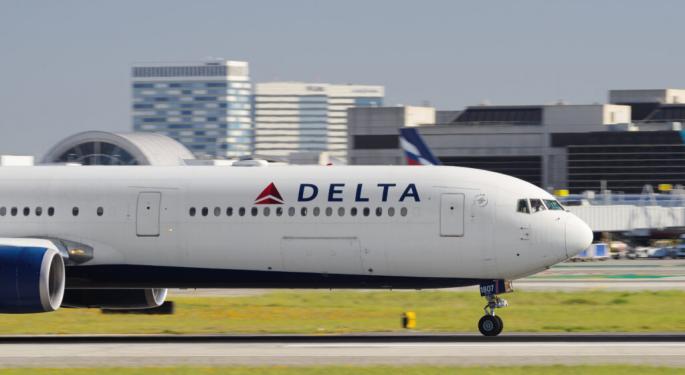Delta's AI Now Sets Unique Prices For Each Passenger—Here's What We Know
Artificial intelligence is quietly reshaping airfare—and Delta Air Lines (NYSE:DAL) is leading the charge.
Delta President Glen Hauenstein said during the carrier's Q2 earnings call this month that the airline has begun using AI to determine personalized ticket prices, setting about 3% of its fares today, with plans to scale that to 20% by the end of the year.
Hauenstein described the shift as a full reengineering of fare pricing, with the AI system working to find "the right price at the right time to the right customer."
Don't Miss:
- 7,000+ investors have joined Timeplast's mission to eliminate microplastics—now it's your turn to invest in the future of sustainable plastic before time runs out.
- $100k+ in investable assets? Match with a fiduciary advisor for free to learn how you can maximize your retirement and save on taxes – no cost, no obligation.
AI Pricing Rolls Out—But Cautiously
The AI pricing initiative remains in early testing. "We're letting the machine go ahead and price in a very controlled environment," Hauenstein said. "We're going to take our time and make sure that the rollout is successful as opposed to trying to rush it and risk that there are unwanted answers in there."
The pilot began with about 1% of fares and now manages 3% of domestic ticket prices. Hauenstein said the system is a part of a "multi-year, multi-step process," describing it as a model that improves with exposure. "You have to train these models," he said on the call.
The pricing system was developed in partnership with Israeli AI startup Fetcherr, which also works with airlines like Azul, WestJet, and Virgin Atlantic, according to Fortune.
Trending: This AI-Powered Trading Platform Has 5,000+ Users, 27 Pending Patents, and a $43.97M Valuation — You Can Become an Investor for Just $500.25
Consumer Pushback and Privacy Concerns
Delta's use of artificial intelligence for personalized pricing has drawn criticism from privacy advocates and lawmakers. "They are trying to see into people's heads to see how much they're willing to pay. They are basically hacking our brains," Justin Kloczko, who analyzes dynamic pricing for California nonprofit Consumer Watchdog, told Fortune.
Sen. Ruben Gallego, an Arizona Democrat, called the strategy ‘predatory pricing' in a post on X, writing, "Delta's CEO just got caught bragging about using AI to find your pain point—meaning they'll squeeze you for every penny." However, the ‘pain point' remark was made by Hauenstein and not Delta CEO Ed Bastian during the earnings call.
Airlines and the AI Race
"Delta is the first major airline to speak so publicly about its use of AI pricing," a travel industry analyst, Gary Leff, who first talked about Delta's AI strategy on his View From The Wing website, told Fortune.
Several carriers are turning to different tech vendors. “Fetcherr isn't the only one in this space. JetBlue partnered with FLYR. Virgin Atlantic also reported a 10% increase in seat fees, which were priced dynamically. flydubai is using PROS, and Lufthansa announced a partnership with them as well,” Leff wrote on his website.
See Also: Warren Buffett once said, "If you don't find a way to make money while you sleep, you will work until you die." Here’s how you can earn passive income with just $10.
What It Means for Passengers
AI-driven ticket pricing pushes airlines into a legal gray zone, according to Fortune. While fare customization is not illegal, federal law prohibits pricing based on protected characteristics such as race or gender. However, identifiers like ZIP codes—sometimes used in algorithms—can lead to disparate impacts on marginalized groups, Fortune reported.
A Delta spokesperson told Fortune that the company has "zero tolerance for discrimination. Our fares are publicly filed and based solely on trip-related factors like advance purchase and cabin class, and we maintain strict safeguards to ensure compliance with federal law." The company did not elaborate on whether the safeguards are human or automated.
"The era of ‘fair' pricing is over," Generation AI Author Matt Britton told Fortune. "The price you see is the price the algorithm thinks you'll accept, not a universal rate."
Leff told Fortune that AI might offer upfront discounts when airlines need to fill seats and that shoppers may still gain leverage by browsing in incognito mode or using a VPN to mask their data. However, he warned that airlines could eventually require travelers to log in to access perks like elite status or seat upgrades. That shift could make opting out of personalized pricing more difficult over time.
Read Next: Are you rich? Here’s what Americans think you need to be considered wealthy.
Image: Shutterstock
© 2025 Benzinga.com. Benzinga does not provide investment advice. All rights reserved.
Posted-In: news access Startups AccessNews



